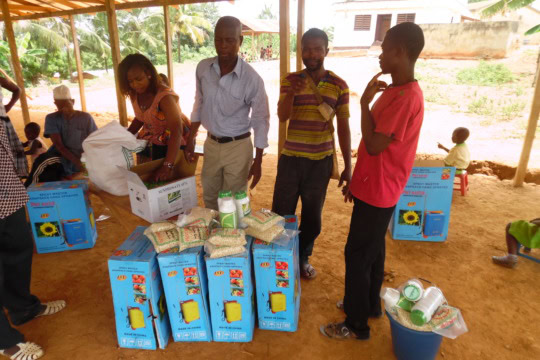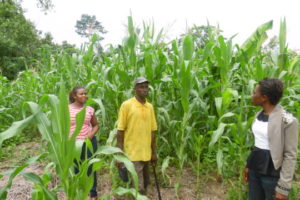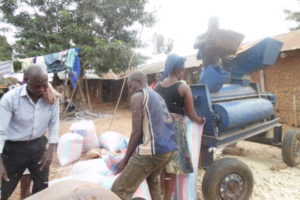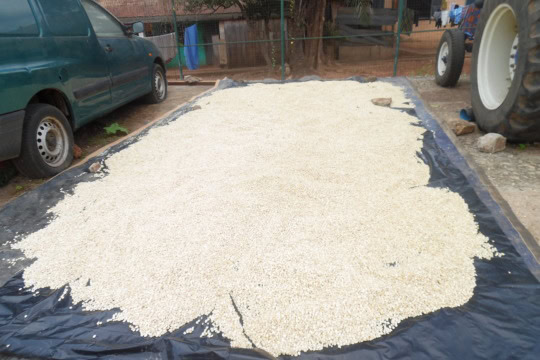
Self-Help International’s approach to alleviating hunger in Ghana is to “teach people how to fish” – or in this case how to farm – to better feed their families long after Self-Help is gone. Last year, six farmers (4 women and 2 men) from Bedaabour were trained and given credit for inputs to cultivate two acres of quality protein maize (QPM) each. Based on the successes recorded in improved yields and increased self-sufficiency, twenty more farmers (seven women and thirteen men) were selected in 2015.
All twenty farmers from Beposo, Bedaabour and Fankamawe participated in the improved agronomic training sessions at the No Till Center at Amanchia in March where Dr. Kofi Boa, renowned researcher and agronomist, trained them. The farmers learned, among other things, that to obtain maximum maize yields, every acre requires 10 kilograms (kg) of certified seed, 100 kg of fertilizer (NPK), 50 kg of Sulphate of Ammonia, 1 liter of Nicoplus (herbicide), and 2 liters of Sunphosate (herbicide). In addition to learning that, for rain-fed agriculture, time is of essence.

SHI providing loans in the form of farm inputs
After the training, the farmers demonstrated a good understanding of the subjects taught during the training sessions, and some even shared their new knowledge and trained their colleague farmers who did not attend the training. But even with this new knowledge, not all of them had the funds necessary to buy the right quantities of inputs to put their knowledge into action and plant on time for the rains.
After seeing the commitment these farmers had to improving their livelihoods by implementing improved farming practices, Self-Help drew up loan agreement documents and provided credit for the inputs needed to ensure farmers could plant on time and repay the loan in kind after harvest. This enabled the farmers to plant on time as well as apply the right quantities of fertilizers and herbicides to maximize yields.
The farmers planted in April and harvested in the first week of August. SHI, together with the farmers, monitored farmlands to ensure strict adherence to the farmers’ trainings. The yield was tremendous compared to past years: double the yields! Typically, farmers from these villages yield between four and six bags of maize per acre, but this season they recorded at least ten bags of quality protein maize (QPM) per acre.

SHI & its farmers monitoring selected farmer’s crops
The farmers emphasized that learning and implementing improved agronomic methods to cultivate maize were the key factors in doubling their yields. The farmers tell SHI that they will always choose Obatanpa (an open pollinated variety of QPM) seeds anytime they cultivate maize in the future because is the best out of all of the local varieties in terms of yield and nutrition. Best of all, they also promise to grow more maize to support the school feeding programs in their respective communities.
At harvest time, the market price for a 110 kg bag of maize was GHC120. If sold, it would have resulted in a net loss for the farmer, so SHI collects loans from farmers in kind rather than requiring farmers to market their maize and pay in cash to ensure they do not sell at a loss. Part of this maize will be used to prepare breakfast for pre-school children within the SHI school feeding program, and the rest sold to purchase inputs for farmers next season.

Shelling maize with the new maize sheller
To avoid selling their maize at a loss, farmers must store their remaining maize until the market price increases. Yet storage is a huge challenge facing farmers in Ghana due to inadequate space and storage structures. Self-Help supports farmers with additional loans so they can purchase silos and other storage facilities to ensure they are able to sell their miaze at a profit, and teaches farmers how to treat and store maize properly: removing it from the cob, winnowing and sun drying before storing it stored in silos to prevent spoilage.
Supporting farmers to own silos and other storage facilities helps better their lots and sustain their resolve to contribute to alleviating hunger.

This year’s harvest of maize sun drying

Powered by Wapiti Digital #servetheherd
This is my rich text.
This is more rich text.
I am a list
Lists are cool